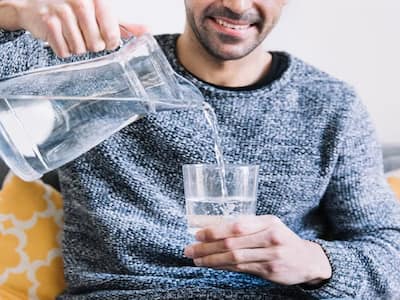
Staying hydrated is essential for good health, but drinking too much water can have serious repercussions. Be aware of the dangers of excessive water intake or water intoxication.
Water is an essential component of human life, playing a crucial role in maintaining bodily functions and overall well-being. Adequate hydration is necessary for optimal health, but like any other aspect of life, moderation is key. While there is a common belief that consuming large amounts of water is always beneficial, excessive intake of water can lead to a range of negative side effects and potential health risks.
Get to know the importance of hydration and the side effects of drinking too much water from Dr. Prachi Bhagwat, Dietitian, Apollo Clinic, Aundh.
The Importance of Staying Hydrated
Hydration is vital for maintaining the balance of bodily fluids, regulating body temperature, aiding digestion, and supporting various physiological processes. The general recommendation for daily water intake varies based on factors such as age, sex, activity level, and climate. The “8×8 rule,” which suggests drinking eight 8-ounce glasses of water a day, is a common guideline. However, individual hydration needs can differ significantly.
Staying hydrated is essential for your kidneys. Dehydration is the important reason for getting urinary tract infection, repeated kidney stones, and getting kidney diseases, but that doesn’t mean that drinking plenty of water will save your kidneys. This is because dehydration is not only the reason for kidney disease, there are multiple other causes of kidney disease cannot be prevented by just drinking plenty of water. Excessive intake of water can at time be dangerous, so you should drink optimum water which means at least to form 1.5 to 2 litters of urine in a day.
The Dangers of Over hydration
Excessive water intake, also known as water intoxication or hypernatremia, occurs when the balance of electrolytes in the body is disrupted due to an overwhelming influx of water. Electrolytes, such as sodium and potassium, are essential for maintaining fluid balance within cells and in the bloodstream. When the concentration of electrolytes becomes diluted due to excessive water consumption, it can lead to serious health complications.
Side Effects of Excessive Water Intake
Hypernatremia: The most significant risk of over hydration is hypernatremia, a condition where blood sodium levels become dangerously low. Symptoms include nausea, headache, confusion, muscle cramps, seizures, and in severe cases, coma and even death.
Kidney Strain: The kidneys play a crucial role in filtering excess water from the bloodstream. Over time, consistently high-water intake can put strain on the kidneys and potentially lead to decreased kidney function.
Fluid Imbalance: Excessive water consumption can disrupt the balance of fluids within cells and tissues, causing swelling and enema. This can be especially dangerous for individuals with pre-existing heart conditions.
Gastrointestinal Issues: Drinking excessive water in a short period can overwhelm the digestive system and lead to bloating, discomfort, and even vomiting.
Nutrient Depletion: Over hydration can dilute the concentration of essential nutrients in the bloodstream, affecting the body’s ability to absorb and utilize nutrients effectively.
Impaired Cognitive Function: Electrolyte imbalances caused by excessive water intake can impact brain function, leading to confusion, disorientation, and impaired cognitive abilities.
READ RELATED: Amazing foods to reduce high blood pressure!
How You Can Prevent Excessive Water Intake
To prevent excessive consumption of water:
Listen to Your Body: Pay attention to your body’s signals of thirst and only drink water when you’re genuinely thirsty.
Moderation: Follow general guidelines for daily water intake but adjust based on your individual needs, activity level, and climate.
Consider Electrolytes: If you engage in intense physical activity, consider consuming beverages that contain electrolytes to help maintain a proper electrolyte balance.
Medical Conditions: Individuals with certain medical conditions, such as kidney problems or heart conditions, should consult a healthcare professional for personalized hydration recommendations.
Balanced Diet:Focus on maintaining a balanced diet rich in fruits and vegetables, as they contribute to overall hydration and provide essential nutrients.
In Conclusion
While hydration is unquestionably essential for human health, excessive water intake can have serious repercussions. Striking a balance between adequate hydration and overhydration is crucial. By listening to your body, understanding your individual hydration needs, and being mindful of the signs of excessive water intake, you can ensure that you maintain proper fluid balance and promote optimal health without subjecting yourself to potential risks. If you have concerns about your hydration habits or specific health conditions, it’s always wise to consult a healthcare professional for personalized guidance.
Total Wellness is now just a click away.
Follow us on
Don’t Miss Out on the Latest Updates.
Subscribe to Our Newsletter Today!
window.addEventListener(‘load’, (event) => {
$(‘#commentbtn’).on(“click”,function(){
(function(d, s, id) { var js, fjs = d.getElementsByTagName(s)[0]; if (d.getElementById(id)) return; js = d.createElement(s); js.id = id; js.src = “//connect.facebook.net/en_US/sdk.js#xfbml=1&version=v2.3”; fjs.parentNode.insertBefore(js, fjs);}(document, ‘script’, ‘facebook-jssdk’));
$(“.cmntbox”).toggle();
});
});








